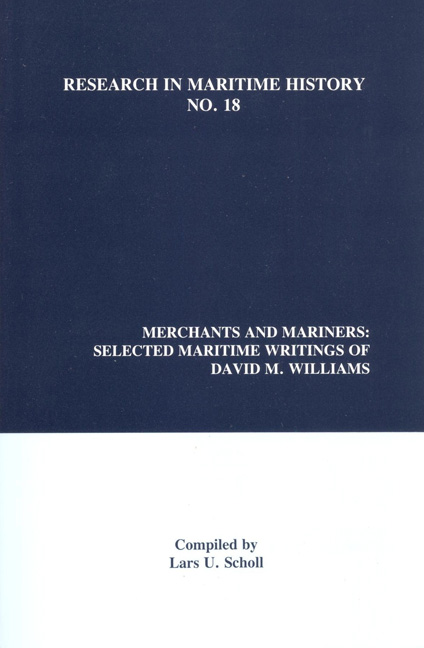“Introduction”
Summary
It was in Berne, Switzerland, that I first met David M. Williams. In late August 1986 we both attended a session on “Shipping Industries in the Nineteenth and Twentieth Centuries” during the Ninth International Congress of Economic History. The conclave, organized by Professors Keiichiro Nakagawa of Tokyo and Peter N. Davies of Liverpool, attracted about three dozen maritime historians from all over the world, including David Williams. I was a newcomer to this crowd, having only once before participated in an international conference in 1984, when I was invited to give a paper at the Fuji Conference on Business Studies in Japan.1 do not recollect precisely when I talked to David for the first time or about what we spoke. From hindsight, I presume I had two reasons for seeking him out. A pragmatic reason was that I felt safe at the side of a friend and colleague of Peter Davies, whom I had met two years earlier in Japan. A more sentimental reason for wanting to speak to the gentleman from Leicester had to do with a brief flirtation I had with an attractive female from that city when as a young man I visited Great Britain for the first time back in the 1960s. Thereafter, whenever Leicester was mentioned I listened attentively.
During the course of the Berne Conference David and I spent much time together, drinking coffee and smoking cigarettes during the breaks or having supper together in the evening before we crossed the magnificent bridge over the River Aare on the way to our respective hotels. When we parted at the end of the conference we were not sure when we would meet next. But one of the results of the conference was the foundation of an organization called, rather prosaically, the Maritime Economic History Group (MEHG), which later was transformed into the slightly more euphonious International Maritime Economic History Association (IMEHA) at a meeting in Leuven, Belgium, in August 1990.
On the initiative of Professors Lewis R. Fischer and Helge W. Nordvik, a semi-annual newsletter began publication in June 1987 to keep scholars interested in maritime economic history informed of developments in the field. The response was overwhelming. By the end of 1988 some eight hundred historians in sixty nations received copies.
- Type
- Chapter
- Information
- Merchants and MarinersSelected Maritime Writings Of David M. Williams, pp. vii - xxviPublisher: Liverpool University PressPrint publication year: 2000



